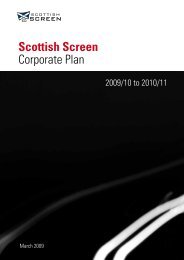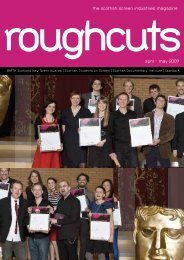You also want an ePaper? Increase the reach of your titles
YUMPU automatically turns print PDFs into web optimized ePapers that Google loves.
4<br />
news<br />
EU approves film tax relief<br />
The European Commission has given State Aid<br />
approval to the new film tax relief on the basis<br />
of some changes being made to the cultural<br />
test.<br />
The new tax credit strongly encourages UKbased<br />
producers to work within the UK and to<br />
focus on aspects of British culture. It can help<br />
to sustain a dynamic and recognisable British<br />
film industry and works to encourage inward<br />
investment in the UK.<br />
In terms of benefit to Scotland, the new tax<br />
credit will help <strong>Scottish</strong> <strong>Screen</strong> continue to<br />
support indigenous talent and production, as<br />
well as to encourage productions to shoot in<br />
Scotland. The new UK points system works in<br />
the same way as <strong>Scottish</strong> <strong>Screen</strong>’s, which means<br />
that productions supported by <strong>Scottish</strong> <strong>Screen</strong><br />
should also be able to access the tax credit,<br />
further promoting Scotland as a place to make<br />
films.<br />
The main highlights of the new tax relief<br />
will mean<br />
• For films that cost up to £20 million, the Film<br />
Production Company (FPC) will be able to<br />
claim an enhanced deduction of 100% with<br />
a payable cash element of 25% of UK<br />
qualifying film production expenditure.<br />
• For films that cost over £20 million, the FPC<br />
will be able to claim an enhanced deduction<br />
of 80% with a payable cash element of 20%<br />
of UK qualifying film production expenditure.<br />
• The minimum UK spend threshold for<br />
qualifying films will be set at 25%.<br />
Revised Cultural Test<br />
The revised cultural test will come into force<br />
once approved by the House of Commons<br />
and House of Lords. The proposed date of its<br />
implementation is 1 January 2007.<br />
The changes from the previously published<br />
cultural test are:<br />
• The Cultural Content section has been<br />
increased from 4 to 16 points.<br />
• The Cultural Hubs section has been reduced<br />
from 15 to 3 points.<br />
• The Cultural Practitioners section has been<br />
reduced from 13 to 8 points.<br />
• A new section has been added, Cultural<br />
Contribution, to which 4 points have been<br />
allocated.<br />
• The total number of points available is<br />
reduced to 31 but the required pass mark of<br />
16 remains unchanged, subject to a ‘golden<br />
points’ rule as follows:<br />
A film scoring all 15 of the points available in<br />
sections C, D and A4, and less than two points<br />
in section A1 and less than two points in section<br />
A2, must additionally obtain the points in<br />
section A3 to pass the cultural test.<br />
If a film scores two points in section A1 or<br />
two points in section A2, it will not require the<br />
additional points from section A3 in order to<br />
pass the test.<br />
Guidance on how the test<br />
will work.<br />
The Department of Culture Media and Sport<br />
(DCMS) revised guidance on the cultural test<br />
is available in full from their website at www.<br />
culture.gov.uk.<br />
The DCMS has set up a special e-mail address<br />
to capture queries. Please e-mail culturaltest@<br />
culture.gsi.gov.uk with your enquiries.<br />
Transitional Arrangements<br />
The HM Treasury has published details of the<br />
transitional arrangements which are available<br />
from their website www.hmrc.gov.uk.<br />
Competition Commissioner Neelie Kroes<br />
commented: “The Commission is satisfied<br />
that the revised UK film tax incentive scheme<br />
complies with the conditions set out in its<br />
Audiovisual Communication. As with other film<br />
support schemes which meet these conditions,<br />
we have been able to apply the cultural<br />
derogation to the general ban on State aid in<br />
the Treaty. We welcome the guidance published<br />
by the UK authorities which confirms that<br />
European co-productions can benefit from the<br />
scheme.”<br />
Ken Hay of <strong>Scottish</strong> <strong>Screen</strong> welcomed EU<br />
approval and said:<br />
“This will at long last provide certainty for the<br />
whole of the industry about both how the tax<br />
credit will operate and from when.<br />
“The only aspect of the new system which we<br />
would like to consider further is how it will<br />
affect minority co-productions. We believe<br />
strongly in supporting <strong>Scottish</strong> producers to<br />
form relationships with fellow producers and<br />
production companies around the world. The<br />
proposed points system may make it difficult<br />
for <strong>Scottish</strong> companies to receive support for<br />
minority co-productions. Often a significant<br />
portion of ‘stories’ being made as international<br />
co-productions, while relevant to the British<br />
public, may not reflect significantly on an aspect<br />
of British culture.<br />
“There is still work to be done in clarifying some<br />
of the definitions in the new guidelines, and<br />
we will work with our partners in the UK Film<br />
Council, DCMS and PACT to ensure that this is<br />
done as promptly as possible.”<br />
New Funding for Education Projects<br />
<strong>Scottish</strong> <strong>Screen</strong> has<br />
launched a new<br />
funding strand for<br />
education initiatives.<br />
The fund has been<br />
set up to promote<br />
the development<br />
of moving image<br />
education and<br />
moving image media<br />
literacy, both in<br />
formal and informal<br />
educational<br />
contexts.<br />
<strong>Scottish</strong> <strong>Screen</strong> is currently piloting<br />
the Moving Image Education<br />
project in a cluster of six primary<br />
schools in Brechin, in partnership<br />
with the <strong>Scottish</strong> Executive and<br />
Angus Digital Media Centre. The<br />
pilot demonstrates the potential<br />
of moving image education, not<br />
just as a critical literacy in the 21st<br />
century, but also as a new way of<br />
teaching across the curriculum.<br />
<strong>Scottish</strong> <strong>Screen</strong> wants to see<br />
moving image education developed<br />
further, and more widely and<br />
sustainably deployed.<br />
Applicants must be either a <strong>Scottish</strong><br />
local authority, an organisation<br />
with a national remit for education<br />
in Scotland, or a <strong>Scottish</strong><br />
organisation with a regional remit<br />
for education seeking to develop<br />
models of moving image education<br />
of potentially national significance<br />
and applicability.<br />
The type of programmes eligible<br />
for funding include: professional<br />
development for schools<br />
professionals; development of<br />
moving image education training<br />
programmes, skills, courses and<br />
resources within local authorities<br />
or teacher education institutions;<br />
or professional development for<br />
education professionals outwith<br />
schools.<br />
The fund is for £80,000 per annum<br />
for 2007/8 and 2008/9. The first<br />
call for applications will close on<br />
6 February for consideration at an<br />
Investment Meeting on 6 March<br />
2007.<br />
For more information about<br />
moving image education and the<br />
funding opportunities available,<br />
please visit the <strong>Scottish</strong> <strong>Screen</strong><br />
website (www.scottishscreen/<br />
education or www.scottishscreen/<br />
funding).<br />
www.scottishscreen.com
















